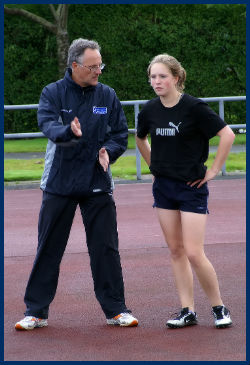Do I Run Okay?
 One of the most common questions I get asked as a coach and Fit Pro is, "Do I run okay?" There is so much information "out there" talking about gait and foot strike and minimalism and this and that and the other thing that it often feels like your brain will burst as it tries to decipher a clear message. As the great George Sheehan, cardiologist and running philosopher, said, "We are all an experiment of one." There is no perfect running form for everyone. As the saying goes, we are all built with different lengths and strengths. What works for one definitely does not work for all.
One of the most common questions I get asked as a coach and Fit Pro is, "Do I run okay?" There is so much information "out there" talking about gait and foot strike and minimalism and this and that and the other thing that it often feels like your brain will burst as it tries to decipher a clear message. As the great George Sheehan, cardiologist and running philosopher, said, "We are all an experiment of one." There is no perfect running form for everyone. As the saying goes, we are all built with different lengths and strengths. What works for one definitely does not work for all.My uncle used to say, "If it don't fit, force it. If it breaks, it wasn't meant to be." Forgive me, Uncle, but that's not the best way to successfully build a cabinet or a running career. As a coach, I care about getting the most out of what you give. Quite literally, that give-and-get takes a different form for different runners. In other words, I don't care where you land on your foot, what the heel-to-toe drop is in your shoes, or whether you're a follower of Lydiard or Igloi, as long as what you're doing works for you. My job to help you find an individual form that keeps you efficient, healthy and happy (conditions which tend to go hand in hand).
Here are some things to consider when working to adapt and evolve into a more efficient and injury-free runner. Unlike a single running style, these things will help all runners:
- Proper Shoes - As I said above, I don't care if you're a heel striker or run on your tippy toes. I care where your foot lands in relation to your center of gravity and that your ankles, knees, and hips line up properly. Getting fit for a pair of shoes that fit your feet and alleviate excessive twisting and loading is top priority for staying healthy.
- Muscle Activation - When compared to our ancestors, we live a very sedentary lifestyle. I don't know about you, but I don't live on dirt trails and spendmy days running to catch food - or avoid being food. Because of our sedentary lifestyles, we have a lot of muscles that are not only weak, but many of them don't activate properly. Take a Functional Strength class to develop the, uh, functional strength needed to benefit from your other training (running, bootcamps, etc). Re-teach your muscles to fire properly if you want to excel. You must learn to walk before you can run, so to speak.
- Flexibility - As I explained above, some muscles don't work properly. Because of that, other muscles are overdoing it, and getting tight as a result. We don't need to make running tougher by fighting our own tied-up-in-knots body. Foam rolling and similar forms of myofascial release are excellent ways to improve flexibility, but they must be supplemented with consistent stretching to help alleviate many of our most common injuries. If you don't like stretching on your own, join a class that includes a focus on flexibility, like our Training Center's Mat Science class.
- Coaching - You know I had to include this one! Having a coach is like having a navigation system in your car. You tell a coach where you want to go, and they give you the directions to get there. You may be able to find your way there without the navigation system, but it'll probably take more time and cause more stress. A coach will also keep big picture in mind so you don't get drawn down a path that will lead to injuries and/or poor performances. Join up with one of FLEET FEET's Training Teams and get help in reaching your goals.
So, when an athlete or customer asks me if they "run okay?" the answer is always "yes... but let me show you some ways to help you take that next step in your evolution as a runner." The FLEET FEET Training Center and Teams can help you take that step. Stop in to any of our four locations and there will be a well-educated Fit Pro there to help you tackle your next big goal.
Good Luck and Happy Racing.
Coach Cary
Connect With Us
see the latest from Fleet Feet St. Louis